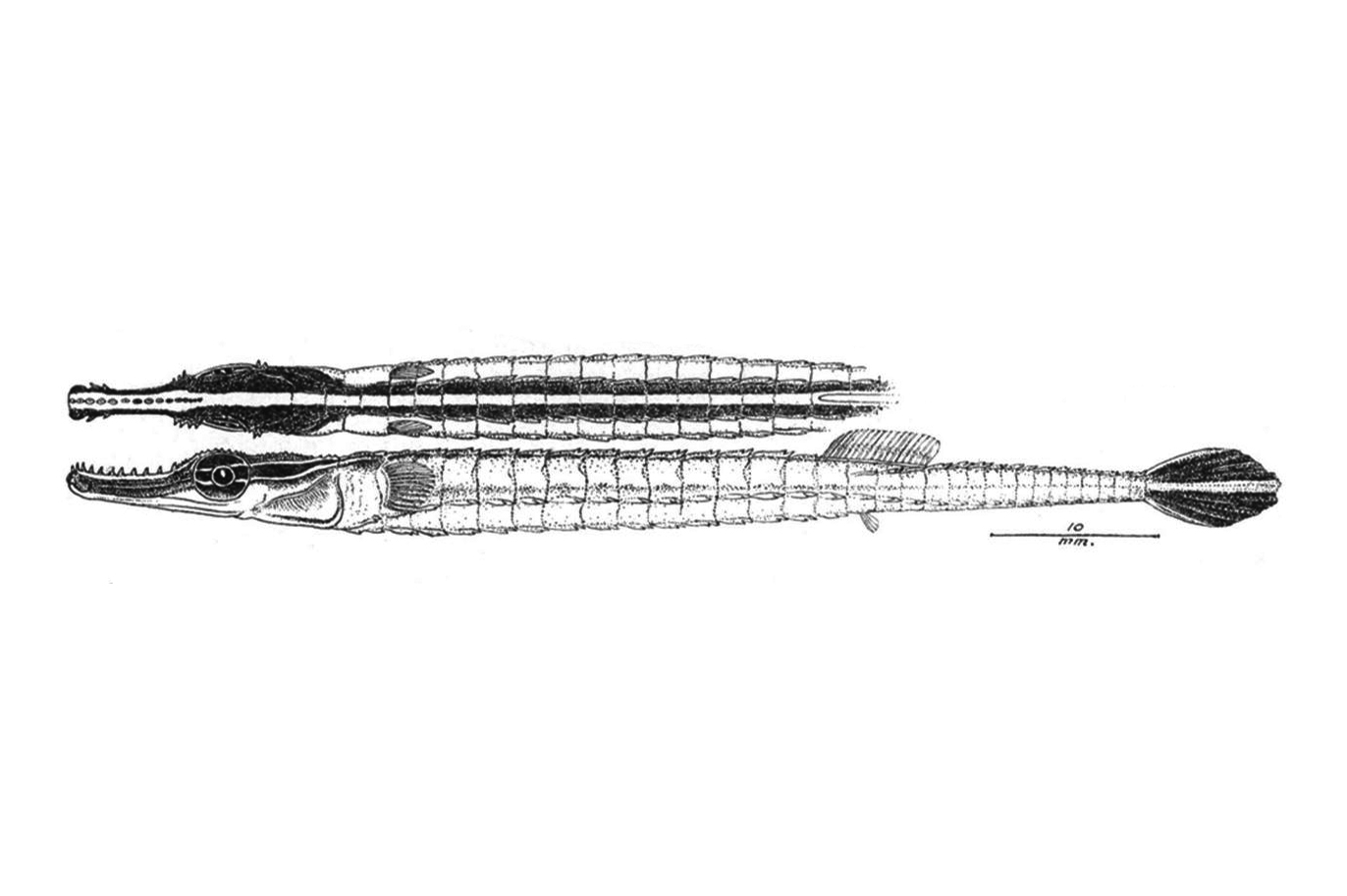Flagtail Pipefish, Doryrhamphus negrosensis Herre 1934

Illustration of a Negros Pipefish, Doryrhamphus negrosensis (holotype of Pristidoryrhamphus jacksoni Fowler 1944), from Vanuata. Source: After Figs. 8-9 in Fowler (1944) Proceedings of the Academy of Natural Sciences of Philadelphia 96: 155-199. License: All rights reserved
A small bluish to bluish-grey pipefish with a pale strip along the top of the head and snout, and a dark tail with a white margin and an orange base.
Flagtail Pipefish, Doryrhamphus negrosensis Herre 1934
More Info
|
Distribution |
Rowley Shoals, Western Australia, and the northern Great Barrier Reef to the Capricorn-Bunker Group, Queensland. Elsewhere the species occurs in the western-central Pacific: Borneo to Vanuatu, Yaeyama Islands in southern Japan, and Micronesia south to Australia. Inhabits sheltered rocky and coral reefs, including mud flats, often living in association with sea urchins. |
|
Features |
Dorsal fin 16-21; Pectoral fin 18-21; Trunk rings 16-17; Tail rings 14-16, Head and body: HL 4.0-4.6 in SL, snout length 2.0-2.1 in HL, snout depth 5.4-7.8 in snout length; males without bony ventrolateral projections on the snout. Superior trunk and tail ridges discontinuous; lateral trunk ridge confluent with inferior tail ridge; principle ridges of posterior predorsal rings and most tail rings with two spines in late juveniles-adults. Caudal fin large, fan-like. |
|
Size |
Grows to about 5 cm TL. |
|
Colour |
Sides of body plain, yellowish without no distinct stripe; dorsal surface with a pale median stripe from snout to 3rd-4th trunk ring; snout blue to grey, darker than body. |
|
Feeding |
Feeds on planktonic micro-crustaceans, and like other Doryramphus species may clean parasites off other fishes. |
|
Biology |
The eggs are brooded by the males in a semi-exposed pouch beneath the tail; males begin brooding at 43 mm TL. |
|
Fisheries |
|
|
Conservation |
Marine listed under the Environment Protection and Biodiversity Conservation Act 1999. |
|
Etymology |
The species is named for the type locality, Negros Island in the Philippines. |
|
Species Citation |
Doryrhamphus negrosensis Herre 1934, Herre Philipp. Exped.: 28, Tide pool near Dumaguete, Oriental Negros, Philippines. |
|
Author |
Bray, D.J. & Thompson, V.J. 2025 |
|
Resources |
Flagtail Pipefish, Doryrhamphus negrosensis Herre 1934
References
Allen, G.R. & Erdmann, M.V. 2012. Reef fishes of the East Indies. Perth : Tropical Reef Research 3 vols, 1260 pp.
Allen, G.R. & Russell, B.C. 1986. Part VII Fishes. pp. 79-103 in Berry, P.F. (ed.) Faunal Surveys of the Rowley Shoals, Scott Reef and Seringapatam Reef, northwestern Australia. Records of the Western Australian Museum, Supplement 25: 1-106
Araga, T. 1984. p. 84 in Masuda, H., K. Amaoka, C. Araga, T. Uyeno & T. Yoshino. The fishes of the Japanese Archipelago. Tokai Univ. Press. Fish. 437pp, 370 pls.
Dawson, C.E. 1976. Review of the Indo-Pacific pipefish genus Choeroichthys (Pisces : Syngnathidae) with descriptions of two new species. Proceedings of the Biological Society of Washington 89(3): 39-66 figs 1-9
Dawson, C.E. 1981. Review of the Indo-Pacific pipefish genus Doryrhamphus Kaup (Pisces: Syngnathidae), with descriptions of a new species and a new subspecies, Ichthyolgical. Bulletin J.L.B. Smith Institute 44: 1-27, figs. 1-17. (as both Doryrhamphus negrosensis and D. negrosensis malus)
Dawson, C.E. 1985. Indo-Pacific Pipefishes (Red Sea to the Americas). Gulf Coast Research Laboratory, Ocean Springs, Mississippi. 230 pp.
Fowler, H.W. 1944. Fishes obtained in the New Hebrides by Dr. Edward L. Jackson. Proceedings of the Academy of Natural Sciences of Philadelphia 96: 155-199. https://www.jstor.org/stable/4064356 (described as Pristidoryrhamphus jacksoni, type locality Vanuatu)
Herald, E.S. & Randall, J.E. 1972. Five new Indo-Pacific pipefishes. Proceedings of the California Academy of Sciences 39(11): 121-140.
Herre, A.W.C.T. 1934. Notes on Fishes in the Zoological Museum of Stanford University. 1. The fishes of the Herre Philippine Expedition of 1931. Hong Kong: The Newspaper Enterprise 106 pp.
Kuiter, R.H. 2000. Seahorses, Pipefishes and their Relatives. TMC Publishing, Chorleywood, UK. 240 pp. (as Doryrhamphus malus)
Moore, G.I., Morrison, S.M., Hutchins, B.J., Allen, G.R. & Sampey, A. 2014. Kimberley marine biota. Historical data: fishes. Records of the Western Australian Museum, Supplement 84: 161-206
Myers, R.F. 1999. Micronesian reef fishes. A comprehensive guide to the coral reef fishes of Micronesia. 3rd revised ed. Coral Graphics, Guam. 330 pp, 192 pls.
Paulus, T. 1999. Family Syngnathidae. pp 2264-2276, in Carpenter K.E. & V.H. Niem (eds) The Living Marine Resources of the Western Central Pacific. FAO Species Identification Guide For Fisheries Purposes. FAO Vol. 4. pp 2069-2790.
Paxton, J.R. 1975. Heraldia nocturna, a new genus and species of pipefish (family Syngnathidae) from eastern Australia with comments on Maroubra perserrata Whitley. Proceedings of the California Academy of Sciences 40(15): 439-447 figs 1-2 (elevated Doryrhamphus negrosensis malus to species level)
Paxton, J.R., Hoese, D.F., Allen, G.R. & Hanley, J.E. (eds). 1989. Zoological Catalogue of Australia. Pisces: Petromyzontidae to Carangidae. Canberra : Australian Government Publishing Service Vol. 7 665 pp. (as Doryrhamphus suillus malus and D. negrosensis)
Pollom, R. 2016. Doryrhamphus negrosensis (errata version published in 2017). The IUCN Red List of Threatened Species 2016: e.T65366280A115419918. https://dx.doi.org/10.2305/IUCN.UK.2016-3.RLTS.T65366280A67621659.en. Accessed on 13 May 2025.
Randall, J.E., Allen, G.R. & Steene, R.C. 1997. Fishes of the Great Barrier Reef and Coral Sea. Crawford House Press. Bathurst. 557 pp.
Whitley, G.P. 1954. New locality records for some Australian fishes. Proceedings of the Royal Zoological Society of New South Wales 1952–53: 23-30 figs 1-5 (described as Choeroichthys suillus malus, type locality Masthead Island, Queensland) See ref at BHL

